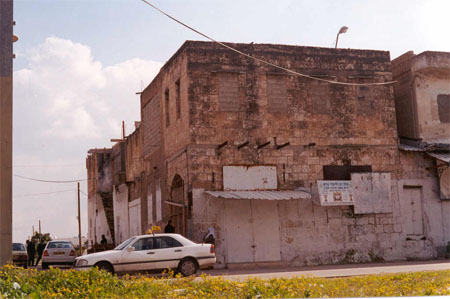
Photo:Lydd, 2002. www.palestineremembered.com
|
 Photo:Lydd, 2002. www.palestineremembered.com |
| Najla 'M'harb', Lydd, April 19, 1999:
|
|
Salah takes us to Hayy al-Mahatta, where railroad employees used to live before 1948, but which nowadays is a low-income area associated with poverty and drugs. I've been told to look for a woman called Najla M'harb, who lives there, and who has a history as an NGO organizer. Salah has to call on friends to help him find Najla's home. He drops us there and disappears, since he doesn't know Najla. We enter a small courtyard through a gate made of a sheet of corrugated iron. A young woman - Najla's daughter Hanine - asks us to sit down in the yard and wait for her mother. When she appears, she is a dignified woman with short gray hair whom one can easily imagine as director of a section of a factory. She says she can only speak to us for a very short time as she has to fax an important document to her son, a student in Haifa University.
Her married name is Zbarka, she comes from Galilee, and her husband is dead. She's very proud that all of her eight children are educated, in spite of her being a widow, and in spite of living in Hayy al-Mahatta. Two of the younger ones, a son and daughter, attractive and neatly dressed, sit with us in the courtyard. Leena wants to photo mother and children together, a triptych of promise emerging out of adversity. But Najla doesn't want to be photographed, not here, not today -- though she promises that if we return some other time, she will allow it. Her daughter Hanine is even more opposed to being pictured in this back yard, where nothing has been painted or mended for years. Najla says she has been interviewed on Israeli TV, and her children's friends asked them, "Do you really live in a place like that?" Hanine has been on a trip to the USA with Jewish students, and maybe will go again next summer. I ask Najla about the NGO associated with her name. She says that a few years back she and two or three other women from Hayy Mahatta formed an association to try and improve |
conditions. Now it has ended because some people weren't honest. Now she just works for her family. She's the 'foreman' of a group of agricultural workers who harvest for a nearby settlement. Unlike most Arab mothers, she rejects being called 'Umm-Somebody', preferring her personal name, Najla. Her clothes and speech robustly proclaim her identity as rural working class.
After the recording, Najla leaves for the Post Office, putting on a 'mandil' (headscarf) that she didn't wear at home. Hanine walks with us to the bus stop back to Tel Aviv.
Najla M'harb begins to speak: |
|
10. I have not been able to locate these places on the map. 11. Probably an "unrecognised" village. |
[Umm Fawaz] [The Women`s Club] Copyright©2005 |
|